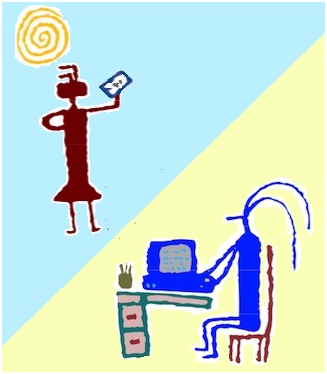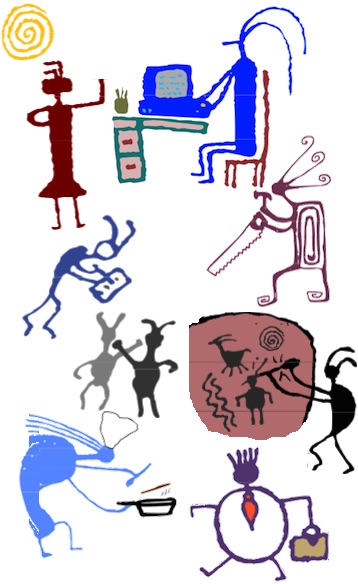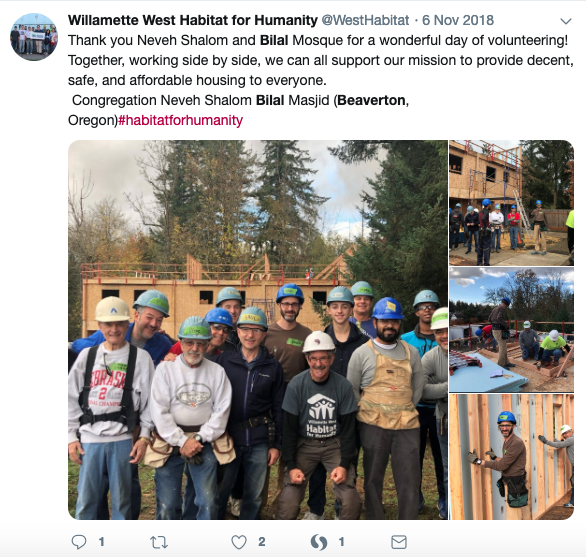Back in the early 1990s, before the World Wide Web began dominating the Internet landscape, there were different platforms that various individuals, groups and communities were using to share resources, have discussions, etc., and some city governments, like Cupertino and San Jose in California, were quick to try to harness such to create more transparency regarding information and decision-making with their constituencies.
Now, 25 years later, city and county governments in particular avoid online engagement. They will post information to agency Web sites but rarely offer a way to comment or discuss such online. A municipality may have a Facebook page for city government, they may have individual Facebook pages for different departments (parks and recreation, health department, etc.), and they may have a Twitter account or two – but citizens are actively discouraged from using the comments on Facebook or replies on Twitter to ask questions, report an issue, express an opinion, etc., and government employees, even volunteer members of government advisory boards, committees & decision-making commissions, are discouraged from interacting with anyone on a public online forum (some go so far as to encourage interactions via email as well).
In April of 2014, Ashley Roth, a resident of Forest Grove, Oregon, population 24,000+, started a moderated Facebook group for the community. She is neither an employee with a government agency nor an office-holder in the city, and she has no affiliation with any newspaper, nonprofit or civic group. Her vision for this online community was similar to those early regionally-based online community efforts back in the 1990s: to create an online discussion space, “a watering hole of sorts for the community, a bulletin board, a place to share events and get involved with volunteering and with the city in an uplifting manner. To positively impact your immediate surroundings and to encourage others to do so, leading by example with what you would like to see from everyone else.”
I’m profiling her Forest Grove Facebook Community here in my blog because I think it’s a great example of the kind of online community those Silicon Valley government leaders envisioned back in the 1990s, and I think the way Ashley administers the group provides a terrific model for any municipality that might dare to buck the current fear-based approach to social media and decide to use it, instead, to engage with their constituency.
What’s also remarkable about Ashley and this group is that Ashley has no formal training regarding meeting facilitation or online community management – yet, her group and moderation style are, in my opinion, a model for others. I’m on or have been on more online communities than I can count, starting back in the 1990s with USENET – my perspective is from more than two decades of experience.
I interviewed Ashley in April 2019 via email for this blog. In the interest of transparency, please note that I am one of the volunteer moderators of this community.
Ashley noted in our interview, “When I first started FGC, I only anticipated reaching roughly 500 members. Little did I know that 500 would more than quadruple in the first two years.” In fact, as of the date of this blog post, there are almost 8000 members of the community. The group averages anywhere from 15 to 40 posts a day – and comments in one day can be just a few dozen to hundreds.
The Forest Grove Facebook community’s region is defined as all of Washington County west of Hillsboro, including the rural communities of Cornelius, Gaston, Gales Creek, Banks and Timber. The group is moderated, but neither posts nor comments are reviewed before they are published – posts and comments are removed only if a moderator notices a violation or such are reported by a community member. The rules for the community are posted on the “about” section of the community, and set the tone for what the community should feel like as well as detail appropriate and inappropriate behavior. Reminders about the rules are posted to the community regularly:
Welcome to the Forest Grove Community page. This page was created by citizens of FG and is not affiliated with the City of FG or its employees. The admins and mods are all volunteers and help to run this page out of the kindness of their hearts :-). Our goal is to keep the community informed on events, history, local meetings and happenings in our town, along with healthy and constructive conversations between all of us. It is always best to lead with respect, as these are your friends, neighbors, teachers, gas attendants, waitresses and business owners. Let’s be exceptionally helpful, we can make this world what we would like to be if we lead by the example we would like to see.
There are rules implemented to make everyone’s life here easier, they are as follows:
- No spamming FGC with multi-level marketing posts or click bait. We DO have a weekly Friday post where you can add your MLM business.
- Slandering a specific person or small local business is highly frowned upon and can/will result in a muting or a ban. We understand rough days but follow protocol with the person/business first, then go ahead and vent.
- Small businesses in our area, feel free to post once per day if it applies to you. Local farms included. While big box stores are fine to share, let’s keep them to a minimum of one per week.
- Please refrain from publicly shaming people unless you have filed a police report and are actively searching for the vehicle/person.
- Politics are fine if they are local to our area. If you have a political discussion you would like to have with the group that is not local to our area, find an admin and run your idea by them first.
- Make it a goal to positively impact your community online, and in person.
- PLEASE feel free to share history, stories, photos, events in town, and any other information that may be beneficial to the community.
- Look at the list of admins, find one you are comfortable with, when it comes time to tag an admin, use your tagging power if you think a post should be examined.
- PM your admin of choice if you are iffy on what it is your posting, they can reassure you if it is appropriate for the page or not.
- Garage sales are totally fine to post, but personal sales (like classified ads) are not. If you have something for free you are giving away to a family in need, those are typically okay to post as well.
- Freedom of speech does not apply to facebook groups, If you want to freak out about free speech and censorship this can and will result in an immediate ban. Private FB groups do not have to cater to your opinions on how the group should be run. This does not make anyone a communist, you were invited into our living room and if you start breaking stuff you don’t get to stay.
- Try to keep the content FG related or related to our general area (Gaston, Cornelius, Banks, Timber, Gales Creek, Vernonia, Cherry Grove, Manning, Buxton, West Hillsboro, Dilley, Laurel) Thanks all! ~FGC Admins
People are added to the community by requesting to join through the Facebook function for such and then answering three questions:
- Do you currently live in FG/Banks/Gaston/Gales Creek/Cornelius/Timber/Vernonia? What is your zip code?
- Are you capable of maintaining civil discourse even in heated discussions?
- Do you agree to check out the “about” section upon joining and agree to the rules posted?
Before approving a member, Ashley can see their answers to these questions as well as the name they use on Facebook, how many friends they have, how many groups they are a part of, when they joined Facebook, and any information they have chosen to share in their profile, such as where they live, where they work, where they went to school, etc. If they haven’t made their posts private, Ashley – and anyone else, for that matter – can see those too. Requests for membership are rejected if the person doesn’t answer the questions, joined Facebook only recently, has no obvious ties to the community, or has a page filled with especially volatile messages, such as tirades against various religions or ethnic groups, insults against ex spouses or ex employers, promotion of violence, etc.
“Profiles with no pictures, no friends, brand new profiles, and covered with troll pictures (yes this is a thing) are not accepted. I have to find at least 1-2 things on your personal profile or by your answers that ties you to our area. If you aren’t very clear, you don’t get to join.”
One of the keys to the community’s success is that Ashley adds new members slowly – just a few each day. “I try my best not to overload the community with new members, because let’s face it, not everyone interacts the same way, and if you add 100 people at a time, all at once, you’re going to have problems immediately.”
Ashley doesn’t manage the community alone: she has anywhere from 4 to 12 volunteer administrators and moderators at any given time. Deleting and banning members is still left entirely to Ashley, but the other resident volunteers help introduce topics, review posts and comments that have been reported by community members for review, delete inappropriate content and remind users of the group’s rules.
Moderators have also begun tagging posts so that certain posts can be more easily found in using the Facebook search function. Tags include:
#event
#government
#police
#volunteer
#fundraise
Ashley identifies and reaches out to potential moderators based on behavior she sees on the community.
“I look for people who are passionate about specific things. Whether it be animals or small businesses, local politics or are really good with laws. I find one trait that stands out above the rest and have them kind of make their presence in that area. I appreciate someone that can use their presence on a post to turn the post from a seemingly negative, into a positive as well. That is very hard to do, but once you get it down, it’s an amazing tool to have in your back pocket.”
The community has helped with recruiting volunteers for various agencies, such as a local homeless shelter, gathering items for a school or art project, rehoming dogs and cats, finding lost pets, educating each other about scams, coordinating ride shares, finding various resources and turning out a large audience for various events. Recently, a woman looking to borrow a sewing machine for a project ended up getting an old but useable machine donated to her. The kindness of someone in line at a grocery store, in a parking lot, or at any customer service situation is a frequent subject. There is a monthly photo contest to choose a new cover photo for the community and a regular Thursday thread for complaints on any subject. Ashley sometimes issues challenges to the community, such as describing their day in meme-form. One of the most memorable threads on the community was a debate about whether or not heavy cream and heavy whipping cream were the same thing, a debate still joked about among long-time community members.
A particularly satisfying moment for Ashley was at a forum for candidates running for the local city council. The organizer asked attendees to raise their hands regarding how they had heard about the event. Just a few hands went up regarding NextDoor. A few more went up regarding the local newspaper. More than half the room raised their hand when Facebook was mentioned – and most were referring to posts on the Forest Grove Community. At least two of the candidates mentioned the group specifically in their remarks.
“What a confidence booster it has been to know roughly 7,000+ of our community members have such a massive amount of trust in me, in what I’m capable of doing, what I bring to the table, and how well I maintain a healthy platform for civilized discussion. Of course, those rewards are typically met with just as much opposition, but I tend to side with light heartedness, it has taken me much farther than misery ever has :-)”
Even with the community continuing to grow and being relied on by so many residents for their information about events in the city, no public officials or only a few city employees will post to the group – and most such posts are in response to a specific incident that is leading to a lot of online speculation.
“The presence of a city official on the community is rare, but it is huge. It helps us as admins to have someone with clear answers to come forward – their official answer shuts up the pitchfork wavers. This is especially true if the community needs an answer that no one else else can seem to find.”
Since city officials and most nonprofits and civic groups are reluctant to use the community, some volunteer moderators make a particular effort to share official news they see on the city and county government’s official Facebook pages, on the pages of local libraries, civic groups, community centers, churches, youth groups, etc. – far more resident volunteers share this information on the community than actual government or nonprofit employees. But since no one has a mandate to share this essential, public information on the community, many events and resources are overlooked.
Moderators delete posts that are only meant to insult (She’s stupid!) or that encourage violence or other criminal behavior (I think you should shoot that rooster that’s waking you up!). Criticisms of businesses are allowed but only if the person first talked to the business in question and tried to get a resolution, and only if the complaint is fact-based, with dates and a description of what happened, rather than out-and-out-opinions about what happened. Posts that show police work in progress in real time – like police with lights flashing outside of a residence – are also not allowed. Political news is allowed – announcements of legislators having a town hall, dates of a public hearing on a local issue, encouragement to vote, links to position papers about upcoming legislation, summaries of what happened at a city council meeting, etc. – but political discussions and debates remain difficult to manage and comments for such often get turned off, or even entirely deleted, when insults, accusations without sources cited and misinformation starts flying.
The busiest days on the community are probably when it snows and the group is flooded with questions and reports about road conditions and school closures.
“I was pleasantly surprised to see that I spend only an average of 1.7 hours on Facebook every day. An average no drama day I search for events to share, or a location/local business to highlight while I’m out running errands for the day.”
But what about a day when an argument breaks out about a new housing development or the closure of a beloved, or controversial, restaurant? “A high drama day, causes massive anxiety and underarm sweat, and I can stare at the page every ten or so minutes for the majority of the day.”
“I check the community page as I would a newspaper every morning, except now, everyone is their very own columnist, and some of them flunked out of basic English long ago and didn’t seem to learn about basic etiquette. You have to constantly add the content you want to see or you end up fighting battles against keyboard warriors all day and night. I think it’s important for moderators to be consistent, to be honest, to be fair, to be transparent about decisions and rules, and to show up. “
But it’s not always easy.
“There are new people added every day. These new people don’t understand the history of the page or why it is the way it is, so they come in and often will beat a dead horse, write angry messages, and belittle other people. Half the time they come around after a little one on one convo with me. The other half of the time I’m given a middle finger emoji and a threat of violence. That’s a reflection of them, not me. We go our separate ways or find a way to work together. Most members understand why it is all unicorns and rainbows, but there is a specific demographic of people that will never be okay with this way of thinking.”
“Every once in a while we have ‘rage quit the page’ posts, where a person feels so personally offended by having their commenting turned off on their post, or by being put in their place by someone sharing facts against their opinion. They make a list to bash the entire page, the admins, and the people of the town before leaving, after the bashing bandwagon shows up to play. The funny thing is, they tend to want to come back a month or two later. The irony of rage quitting is equivalent to just having a bad day and freaking out on anyone within earshot willing to listen. We move on pretty quickly and hope the domino effect doesn’t take place. Once one person starts, it tends to go haywire for a little while. “
“If you come in guns blazing and are VERY set in your ways and ideas, and won’t hear what anyone else has to say? Those are the most inappropriate for the community page. If your personal biases and what you stand for can be presented in a way where there is wiggle room for conversation, then, and only then is it appropriate for the community page. See also: politics, parenting, schools, restaurant blunders.“
And how does she try to calm someone down online?
“95% of it is just throwing a compliment at the most angry person on the post. They tend to either hush up or calm down.  “
“
Moderators will end commenting on threads if the thread turns into speculation or overly-negative commentary, or when the person who started the thread with a question has had that question answered.
There are many online communities set up for people working in a particular profession or people who have a particular hobby, but online communities set up for neighbors in a community can have a much more personal quality – for better or for worse. I asked Ashley why she thought people can get so emotional on or regarding this particularly online community:
“Every post hits home cause it is our home! Community pages are emotional because it is personal. Every change, every tree cut down, every new establishment and closing establishment. We feel it cause we ARE it. As much as I would love to have everyone on the same page emotionally, I certainly wouldn’t try to fill the ocean with a paper cup.”
It’s that personal nature of the community that can make moderation most difficult: people know each other, their spouses, their children and their extended families offline, face-to-face. They will encounter each other at school functions and city events. They may work together. They may be neighbors. That means a heated online argument isn’t something abstract: it’s with a real person in your actual, physical community. This can be particularly taxing for the moderators – especially the founder:
“I have had death threats, I have been hacked and had to change my phone number, email address and even my Facebook profile for a bit to ‘hide’ from people who hated that I took their ‘rights away’ from them because I have removed them from the group for violating our rules. And they stay off until they calm down and apologize and want to join the group again, of course, I am a sucker for second chances. A blessing and a curse. The ONLY thing that prompts threats are people assuming I am taking their basic rights away, freedom of speech, in particular. The threats can be unnerving. To say I am fearful is not true, but to say I am very careful is. To be a great admin, you must take shape, stance, and emotions similar to a robot :-)“
Ashley makes a screen capture of every post, comment or direct message to her, on Facebook or via another platform, that is especially insulting or is threatening, in case a situation with someone escalates to the point of needing a legal intervention which, so far, has not been necessary. Ashley has also taken breaks from moderating for weeks, even months at a time.
“Being a leader on a small town community page comes with much more heartache I can’t even begin to explain to you, but alas, the good is worth it in the end. I also had no idea that you CAN help people change their way of thinking, and to encourage mature conversation, and then watch it executed out of someone you never in a million years thought would be able to calm down and make sense. That was all just wishful thinking that has become reality, for the most part.“
Other, rival Facebook communities for the city have been attempted by those that do not like that the Forest Grove Community is strictly moderated. Two have survived – one with about 1700 members and about eight posts a day, another with less than 200 members. A group that is supposed to be just about “what’s happening” will go weeks with no posts at all. For whatever reason, the Forest Grove Community has not only lasted, but continued to grow.
Ashley won’t be the moderator forever – but also hasn’t been able to find an agency or organization willing to assume responsibility for the group when she wants to step away. No matter who is in charge of the group, whether someone entirely on their own or someone representing a program or agency, that person will change the group with his or her own interpretation of the community’s mission and rules. It’s natural for online communities to change, evolve, splinter or even die off. But without a strong, community focused newspaper and/or local radio station, it’s hard to say what would keep so many residents informed and engaged to discuss local issues.
What is Ashley’s advice for other moderators of such regionally-based online communities, regardless of the platform used?
“Have a clear reason what the community is for and state it, repeatedly. Have a clear purpose for every message. Have facts to back up comments. Have patience to deal with folks from all walks of life and with a variety of communication levels. It’s all about what you say and how you say it that generates responses. I could piss everyone off in the same sentence as picking everyone up in the group, but they WILL remember the negative thing I said 10 times more than the positives. To put yourself out there, you have to be ready to do so. Remember that no one has the same heart as you. No one has the same interests, ideas, or opinions as you do. No one is superior or inferior to you. We all live here together. Sometimes shifting our own thinking is key to being an all inclusive community.
And don’t push yourself farther than your mental health can handle. ♥️”
Are you interested in starting an online community for a neighborhood, town, city, county, school, or other small, defined region, one that’s meant to promote civility, promote civil society and build understanding? Please see this resource to help you.
Also see:
If you have benefited from this blog or other parts of my web site and would like to support the time that went into developing material, researching information, preparing articles, updating pages, etc., here is how you can help.






 Despite lack of funding, I do my best to
Despite lack of funding, I do my best to 
 “
“ Corporate social responsibility (CSR) means financial donations by for-profit businesses, as well as in-kind donations, employee volunteering or taking on community roles as a representative of a company, such as serving on an advisory board at a nonprofit or government group. CSR also includes commitments and demonstrated action regarding responsible or sustainable environmental practices, pay equality, safe working environments, etc., beyond what is required by law.
Corporate social responsibility (CSR) means financial donations by for-profit businesses, as well as in-kind donations, employee volunteering or taking on community roles as a representative of a company, such as serving on an advisory board at a nonprofit or government group. CSR also includes commitments and demonstrated action regarding responsible or sustainable environmental practices, pay equality, safe working environments, etc., beyond what is required by law.

